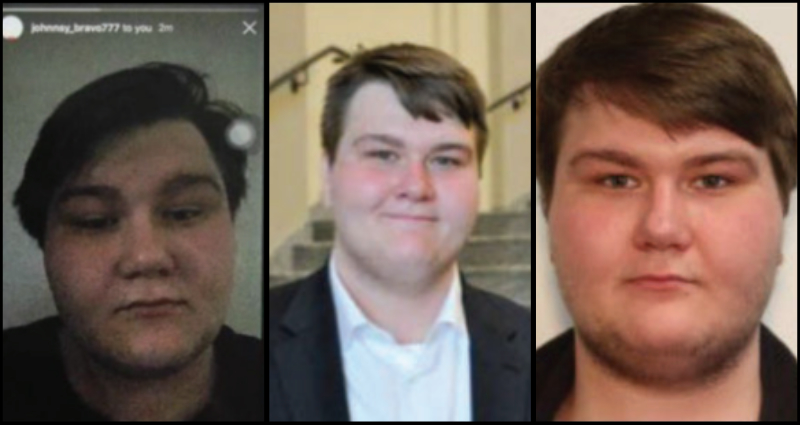
Georgia cyberstalker convicted of threatening Boston-area woman to keep 3.5-year sentence
A last-ditch effort by a convicted Georgia cyber-stalker — who targeted a Boston-area woman for more than a year — to reduce his prison sentence has been denied by a federal appeals court.
“Sweetheart I have hundreds of vids and thousands of pictures meticulously categorized by name. I had your hidden in the 8th season of game of thrones (which no one would ever click on) on my external hard drive. They are gone. No one will ever know about this but me and you,” said Georgia master’s student Gary Leach to a victim from “eastern Massachusetts.”
Leach was blackmailing the woman, known as Joe Doe A, to make her perform “explicit and degrading” sex videos for him on a regular basis.
In October of 2022, U.S. District Court Judge Angel Kelley sentenced Leach, 26 or 27, of Athens, Ga., to three and a half years in federal prison after he pleaded guilty to two counts of cyberstalking and a count of interstate threats. The sentence came in a full six months longer than federal prosecutors had asked for. The next month, his attorney filed notice that the sentence would be appealed.
“Mr. Leach had no opportunity to confront the court’s mistaken belief that his case fell outside the mine-run of cyberstalking and threats cases. Given the government’s decision to ask for a within-guidelines sentence and its willingness to enter a plea agreement that let Mr. Leach ask for a below-guidelines sentence, he focused on convincing the court to vary downward,” attorney Christine DeMaso, of the federal public defender’s office in Boston’s Seaport, wrote in her argument filed in the 1st Circuit Court of Appeals last September.
“He was unaware of the court’s perception that his case was worse than the norm, and he had no incentive or opportunity to confront it,” she continued.
The case was argued before the circuit on Nov. 8. On Dec. 21, the court affirmed the judgment and sentencing, including the additional condition that Leach not take on a job that involves interacting with children.
“At various times during 2019 and 2020, the appellant attempted to solicit video performances of a sexual nature from at least a dozen Instagram users,” Circuit Judge Bruce M. Selya wrote in summary of Leach’s crimes, adding later a description of how he treated the Boston-area victim: Throughout these interactions, Jane Doe A repeatedly expressed her desire not to perform the coerced acts. At one point, she told the appellant, ‘I just wanna know why you want to make me so miserable and to keep chasing me like this.’ He replied, ‘Honestly, it’s fun and you’re hot.’”
Eventually the woman had enough and reached out to the FBI.
According to the FBI, the victim said she first communicated with Leach in October of 2019 when she had reached out to him after reading a comment he had posted on an erotic type of photo on Instagram. Leach agreed to pay $200.
They connected via Instagram’s video chat feature, where Leach could see her but he left his screen blank, according to the affidavit filed in the case. In the 10 minute interaction, the woman followed Leach’s directions “to undress and perform various actions of a sexual nature.” They chatted again in another video later in the day, this time Leach shared video of him pleasing himself to her.
But Leach never paid her as they had agreed and said he needed more time to send the CashApp payment. When she declined to do more video sessions without payment, Leach never responded or paid her and then vanished from the platform.
Two months later, Leach reached out to her on another account and asked what her father would think if he shared the videos he had recorded. That started the harassment campaign that went on for more than a year and across new Instagram accounts, including one deep in the harassment period “u.know_who” and, later, “u.gotta_kno.who.”
On Feb. 19, 2020, Leach reached out again and when he hadn’t received a response from the victim, he wrote, “So I guess I’ll go ahead and post those,” referring to videos he had surreptitiously recorded of her.
She responded, “What do you want?”
He sent her the videos and then they made an agreement that he would delete the videos if she did another call for him. The call lasted 15 minutes and he did not keep his word. The harassment got worse.
“Hmmm…. so you agree to do whatever I want once a week?,” he wrote to her. “From now on you call me master,” according to the FBI’s affidavit.
He solicited videos and pictures constantly until he was arrested on April 22, 2021, a day after the complaint was filed.
The appeals court added the further sentencing condition that he not take a job where he interacts with children, observing: “In this instance, the record makes manifest that the appellant, using one of the same anonymous accounts that he used to harass his victims and seek sexually explicit content, exchanged messages with a social media user who had represented herself as a fifteen-year-old girl. Even though this exchange was not overtly sexual in content, we cannot envision a scenario in which an adult with good judgment about how to interact with children would find it appropriate to reach out to a minor in this context.”
On Jan. 12, Leach’s attorney once again asked for a lesser sentence and the Appeals court denied it on the same day, according to a document filed Monday in the case.


